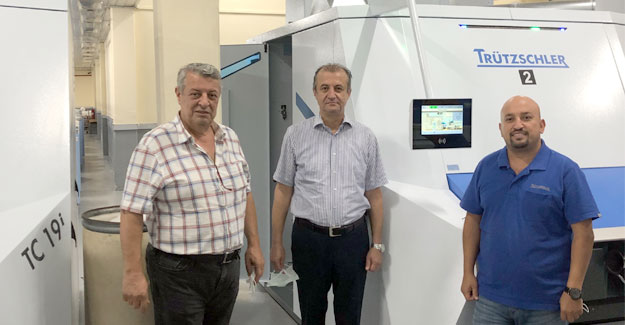
Truetzschler TC19i: A New Benchmark For MMF Processing
Man-made fibres are durable, versatile and cost-effective. That's why they have become indispensable in yarn production over the past decade and now account for more than 40% of staple fibre consumption. Truetzschler has supported this trend by developing highly specialised machines for man-made fibres that meet constantly rising expectations for quality and efficiency - and the TC 19i is now winning over customers worldwide. The intelligent card TC 19i for man-made fibres was launched in 2019 and is now the international benchmark for man-made fibre processing. The results from major textile markets across Asia, Europe and the Middle East speak for themselves: customers were able to increase productivity by between 20% and 100%, while also improving quality (IPI) by between 20% and 55%. Turning skeptics into believers Acarsoy Tekstil, a leading yarn manufacturer based in the Bursa province of Turkey, is a strong example of what can be achieved with the TC 19i for man-made fibres. The company has a daily production capacity of 65 tons of yarn across two production facilities, and manufactures a broad portfolio of cotton, linen, polyester, viscose, modal and lyocell yarns. Its processes include ring, compact, air jet, open end, core spun and siro spun technologies. Experts at Acarsoy Tekstil were initially skeptical when Truetzschler TC 19i cards were installed in the second air jet line for 100% viscose yarn (Ne 20 to 28). General manager Bülent De?irmencio?lu, as well as his team of operations and maintenance managers, were unsure whether the required level of quality could be maintained when the TC 19i operated at such high speed. However, they were able to produce 60% faster with the TC 19i, and clearer cut numbers were 50% lower than the first line. In light of these impressive results, Acarsoy is now considering modernising its other machines too. "Cards are the beating heart of the spinning mill," says Bülent Degirmencioglu (pictured in the middle). "We know we've made the right choice with the TC 19i for man-made fibres because it's taking our superior quality to the next level - while also cutting waste, reducing energy consumption and saving labour costs." Major improvements across all man-made fibre applications Every single one of the manufacturers that tested the TC 19i for man-made fibres has been able to increase productivity and reduce yarn imperfections compared to predecessor machines. Of course, individual results vary depending on the customer's specific application, raw material and process - but the TC 19i achieved success every time. This success is largely made possible by the T-GO gap optimizer, which has been specifically adapted to meet the requirements of man-made fibre applications.
- Stainless steel comb instead of screen fabric
- Stainless steel cleaning flap
- Stainless steel reserve trunk
- Segmented feed tray
- Special opening rollers for higher speeds
- Stainless steel reserve trunk
- More carding and less cleaning elements
- WEBFEED with a large needle roller
- T-CON 3 and T-GO Gap Optimizer for man-made fibres
- Additional deflection roller
- New doffer clothing TCC NovoDoff 3211”
Textile Excellence
If you wish to Subscribe to Textile Excellence Print Edition, kindly fill in the below form and we shall get back to you with details.












